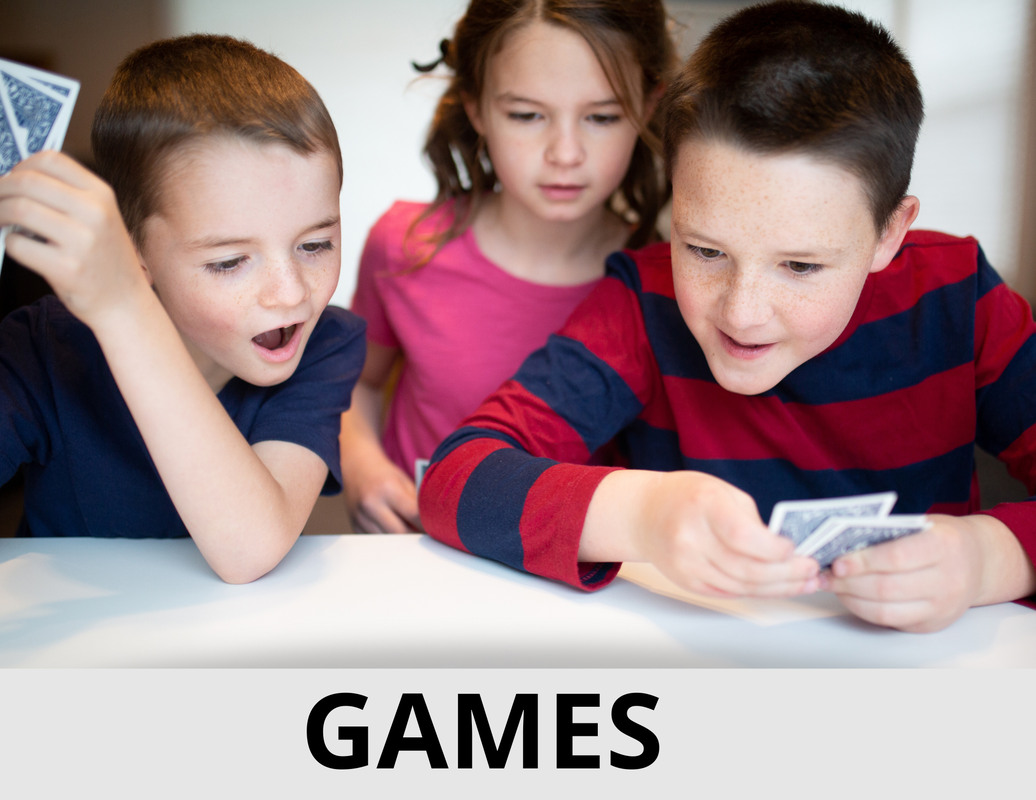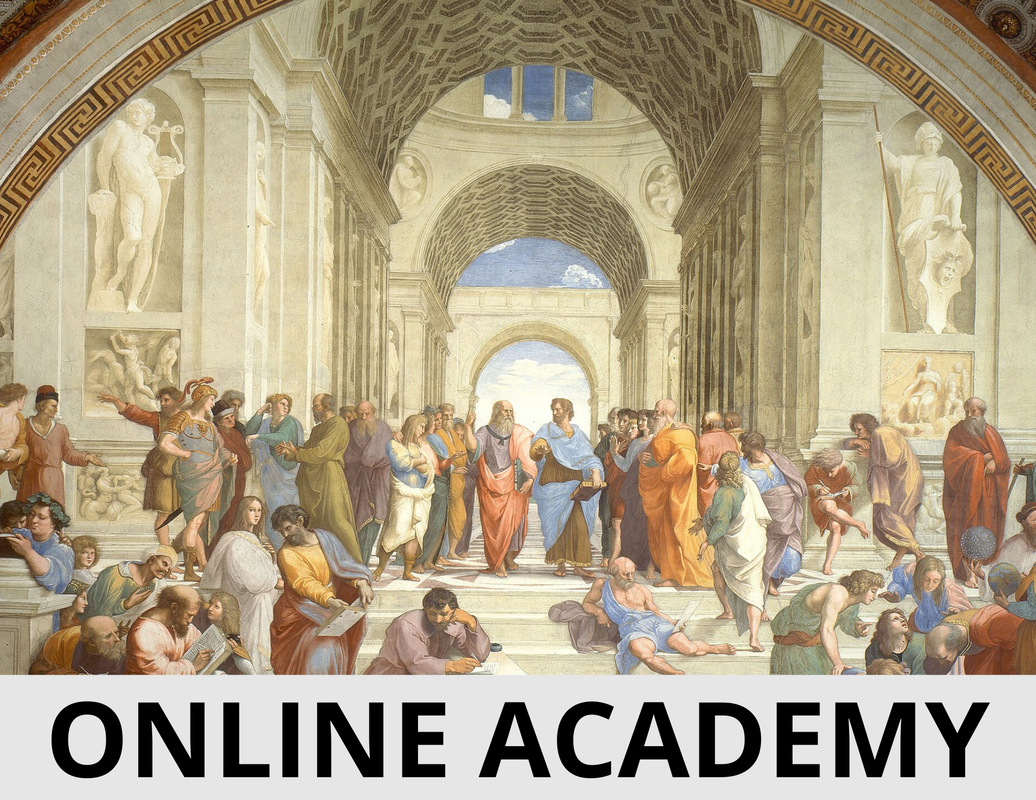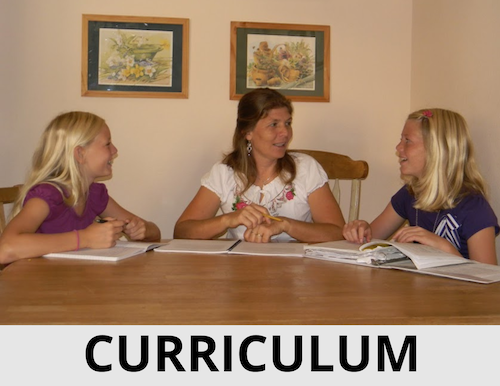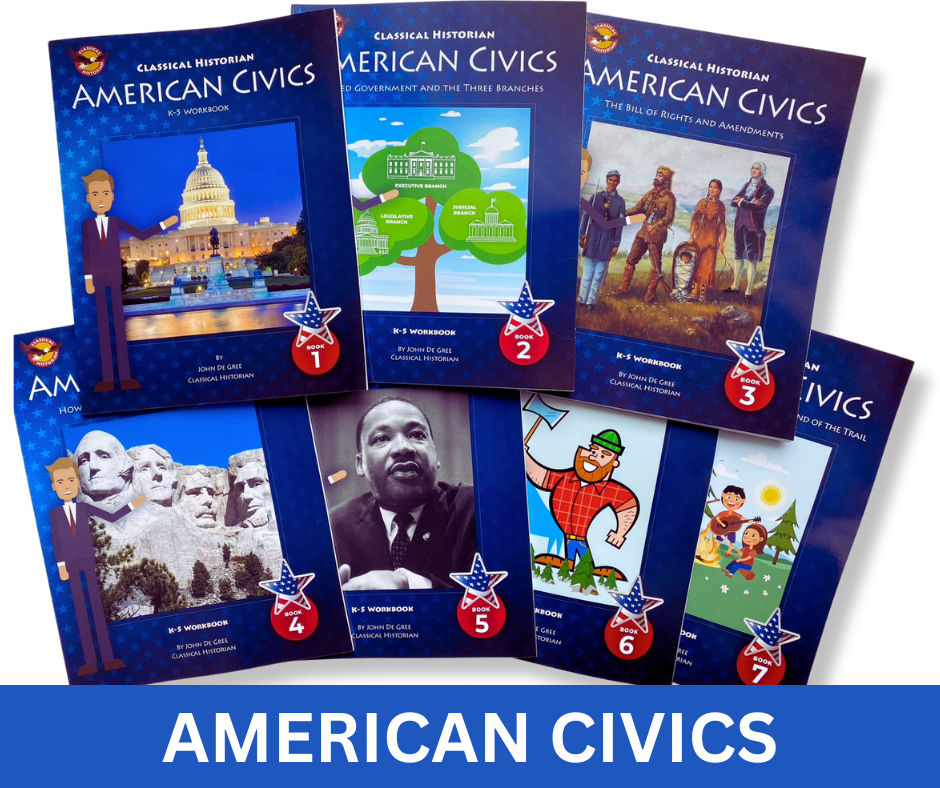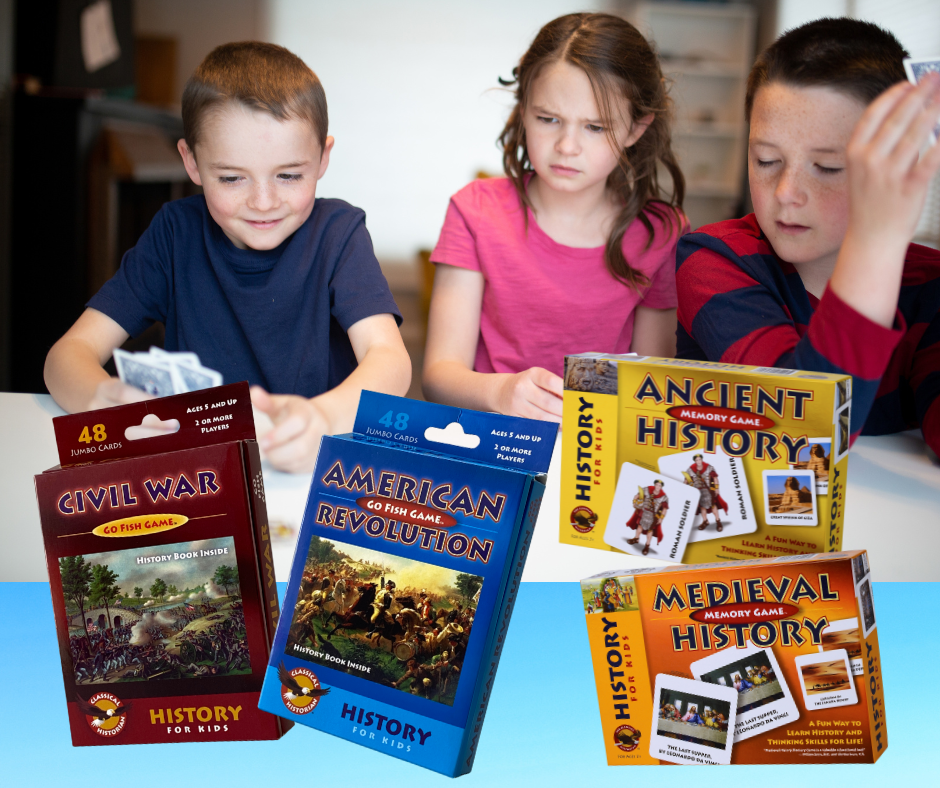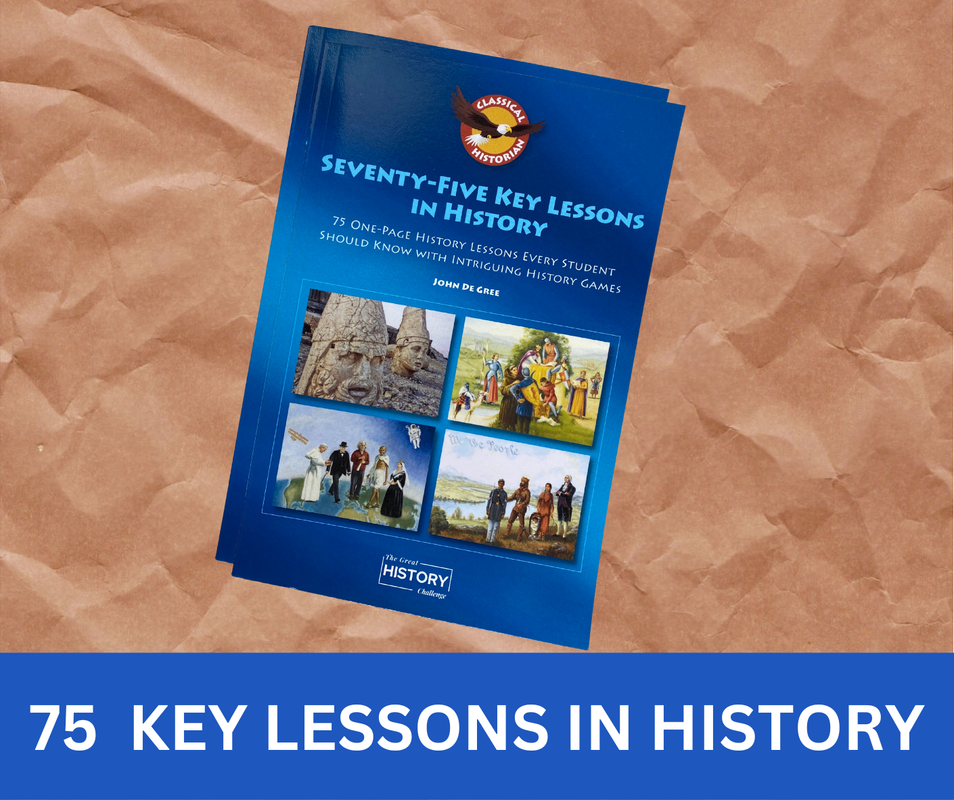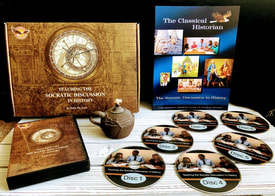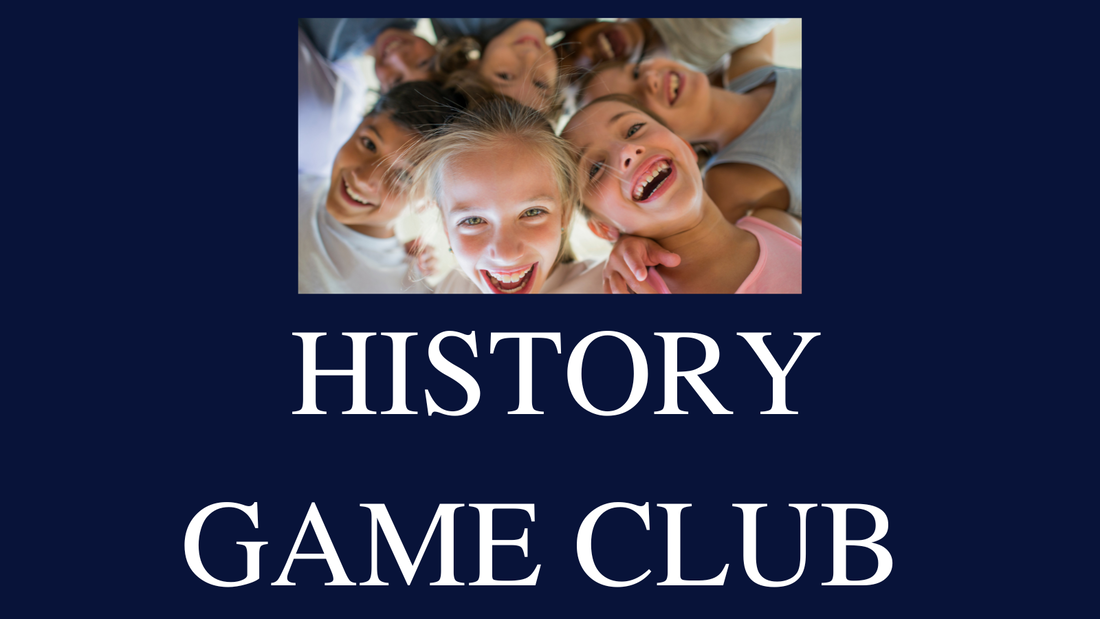"Liberty, when it comes to take root, is a plant of rapid growth." George Washington
A Socratic Approach to History
The study of history is not merely an academic exercise. Rather, it is a discipline that leads to self-knowledge. This, at least, is the Socratic approach to history.
Socrates, the father of Western philosophy, said that the unexamined life is not worth living. In his Socratic Method, he challenged students to develop judgments based on solid evidence and sound reasoning. This Socratic Way is at the core of a classical education.
Using our classical history curriculum, educators teach history through the Socratic discussion. With our history games, they harness competitiveness for good. And in our Online Academy, homeschoolers from across the country meet to discuss history, literature, and government & economics.
Socrates, the father of Western philosophy, said that the unexamined life is not worth living. In his Socratic Method, he challenged students to develop judgments based on solid evidence and sound reasoning. This Socratic Way is at the core of a classical education.
Using our classical history curriculum, educators teach history through the Socratic discussion. With our history games, they harness competitiveness for good. And in our Online Academy, homeschoolers from across the country meet to discuss history, literature, and government & economics.
Article of the Month
|
|
July 4th Independence Day Lesson
|
Teaching the Socratic Discussion in History
Apply the Socratic approach to history with confidence using this seminar for Socratic history teachers. No prior experience is required! With this guide, school and home educators gain the skills needed to train future historians.
Prefer streaming? JOIN THE DOLPHIN SOCIETY to access this course and more.
JOIN
|
Events
Meet Us At a Convention!
|
Great History Challenge May 23–25, Chicago, IL
Utah Fits All Scholarship June 15th, Salt Lake City, UT SCCHE June 22nd, Costa Mesa, CA AFHE July 12–13, Phoenix, AZ Vertical Divider
|
June 15-18th, Ontario, CA
July 11-13th, Round Rock, TX |
Testimonials
Live Online Classes:
The class is really amazing. This is our first year homeschooling and we were previously at a private "classical" school. The teacher is knowledgeable and most importantly is patient and explains the topics until the students understand the discussion. Mary Lou - Parent
The class is really amazing. This is our first year homeschooling and we were previously at a private "classical" school. The teacher is knowledgeable and most importantly is patient and explains the topics until the students understand the discussion. Mary Lou - Parent
I have really enjoyed taking this class, I feel as though I have learned a lot about the way our country works. I really appreciated that instead of just stuffing our heads with facts, we were encouraged to think critically and form our own opinions about different topics. The small class size was really helpful because it made it easy to voice my thoughts and to hear other opinions. I feel that Mr. De Gree really believes in what he is teaching and he really cares about giving us the tools to be effective members of our society. I believe that after taking this class, I am much more knowledgeable and equipped to be an active participant in our government.
Hannah - Student
Hannah - Student
Classical History Curriculum:
I absolutely LOVE the critical thinking aspects of the (Take a Stand!) curriculum. Too few curricular address the idea of critical thinking skills. There is much written for the children to memorize and recount at the appropriate times, but are they understanding what they are reading? Implementing critical thinking into the reading and discussion of history is a powerful tool to help our children understand what they are reading as well as form an opinion and knowledge that they will be able to use in many situations in life. I also love the discussion and multi-age aspects of the curriculum. Being able to have discussions around the dinner table with family are some of the most important times you will have will your children. These are very good learning opportunities that are disappearing from too many families today. The children are able to read the material and discuss it at their level; they will understand the material better with discussion and help teach each other at the same time. This would also work wonderfully in a homeschool co-op setting! I have been looking at a number of different social studies programs for the middle and older grades and am very excited to come across Take a Stand! I am anxious to use it in my homeschool as well as recommend it to others. Amy B., Maine - Parent
I absolutely LOVE the critical thinking aspects of the (Take a Stand!) curriculum. Too few curricular address the idea of critical thinking skills. There is much written for the children to memorize and recount at the appropriate times, but are they understanding what they are reading? Implementing critical thinking into the reading and discussion of history is a powerful tool to help our children understand what they are reading as well as form an opinion and knowledge that they will be able to use in many situations in life. I also love the discussion and multi-age aspects of the curriculum. Being able to have discussions around the dinner table with family are some of the most important times you will have will your children. These are very good learning opportunities that are disappearing from too many families today. The children are able to read the material and discuss it at their level; they will understand the material better with discussion and help teach each other at the same time. This would also work wonderfully in a homeschool co-op setting! I have been looking at a number of different social studies programs for the middle and older grades and am very excited to come across Take a Stand! I am anxious to use it in my homeschool as well as recommend it to others. Amy B., Maine - Parent
Grace had an excellent time using your program. It was a terrific way to have her delve deep into history. I very much appreciated that she learned the skills of the Socratic discussion while learning about history. Also, Grace has learned how early civilizations can have a great impact on other civilizations. I'm glad that she is strengthening her knowledge of how the various events of history affect each other. Your prompts for every essay brought my daughter to think critically. On top of all this, your videos were a great aid. Thank you very much.
Mrs. Moore - Parent
Mrs. Moore - Parent
History Games:
Thanks!! I am loving the Medieval History Memory Game. It PERFECTLY complements our Classical Conversations Cycle this next year! Stephanie Buckner - Parent
Thanks!! I am loving the Medieval History Memory Game. It PERFECTLY complements our Classical Conversations Cycle this next year! Stephanie Buckner - Parent
Schools:
"I highly recommend The Classical Historian to any administrator looking for an outstanding history curriculum for their program. Within the classical education model history teachers are asked to go to original sources and conduct Socratic seminars. The Classical Historian offers this material in easy to reference and implement formats with assignments, instructional guides, and step by step Socratic seminars. Any student taking these courses not only becomes highly educated in history but also a critical thinker. Mentoring new teachers in the classical model can be a monumental task. This curriculum trains a teacher through a sound educational approach and puts master teacher instruction into their hands. This curriculum was the answer to years of inconsistent course offerings. It has turned a struggling history program into one of our greatest strengths. Thank you!"
Christianna Fogler, Chief Executive Officer, Rocky Mountain Classical Academy, Colorado Springs, Colorado
"I highly recommend The Classical Historian to any administrator looking for an outstanding history curriculum for their program. Within the classical education model history teachers are asked to go to original sources and conduct Socratic seminars. The Classical Historian offers this material in easy to reference and implement formats with assignments, instructional guides, and step by step Socratic seminars. Any student taking these courses not only becomes highly educated in history but also a critical thinker. Mentoring new teachers in the classical model can be a monumental task. This curriculum trains a teacher through a sound educational approach and puts master teacher instruction into their hands. This curriculum was the answer to years of inconsistent course offerings. It has turned a struggling history program into one of our greatest strengths. Thank you!"
Christianna Fogler, Chief Executive Officer, Rocky Mountain Classical Academy, Colorado Springs, Colorado
All around:
Classical Historian has been a gift to our family! As a homeschooling mom for 10+ years, I’ve carefully vetted science curricula for my children, since our family’s beliefs often don’t align with many secular science choices. However, I didn’t realize I should be paying close attention to history curriculum, too. In the past several years, I began to learn about the anti-American spin in many history books. Last year, with growing awareness, my search for a curriculum that I felt presented truth brought me to Classical Historian. We have been purchasing their materials since then and are very pleased with the content and the reader-friendly materials. They have a variety of options, including live, online classes, recorded classes, and student texts with teacher guides. The customer service has been fantastic! Five stars!!!
Moriah Chon - Parent
Classical Historian has been a gift to our family! As a homeschooling mom for 10+ years, I’ve carefully vetted science curricula for my children, since our family’s beliefs often don’t align with many secular science choices. However, I didn’t realize I should be paying close attention to history curriculum, too. In the past several years, I began to learn about the anti-American spin in many history books. Last year, with growing awareness, my search for a curriculum that I felt presented truth brought me to Classical Historian. We have been purchasing their materials since then and are very pleased with the content and the reader-friendly materials. They have a variety of options, including live, online classes, recorded classes, and student texts with teacher guides. The customer service has been fantastic! Five stars!!!
Moriah Chon - Parent
Teaching History through the Socratic Discussion
From our founder, John De Gree
Both practice and research confirm that a student is ready to read history texts critically, form a perspective on a Socratic discussion question, and defend their judgement in speech and writing from about the age of 11 or 12 (sixth grade).
A highly influential author among classical educators and home school families, Dorothy Sayers, wrote in “The Lost Tools of Learning” that students need first to learn the analytical tools of learning before they learn a variety of “subjects.” She separated a student’s life into three stages:
A highly influential author among classical educators and home school families, Dorothy Sayers, wrote in “The Lost Tools of Learning” that students need first to learn the analytical tools of learning before they learn a variety of “subjects.” She separated a student’s life into three stages:
- Grammar
- Dialectic
- Rhetoric
The Grammar Stage of Classical Education
The Grammar stage is appropriate before the age of 11 or 12. Sayers called this stage the “Poll Parrot” phase because the child is so intent at pleasing his parent that he will parrot whatever the parent teaches him. I’ve met many parents of children at age ten who are very worried their children are not independent thinkers, and they think that there is something wrong with their teaching.
If this is your situation, don’t worry — rejoice! It is a beautiful thing to work with a child before he becomes argumentative. In the Grammar Stage, it is enough if the child spends time reading interesting stories about history, playing history games, and learning basic geographical facts.
If this is your situation, don’t worry — rejoice! It is a beautiful thing to work with a child before he becomes argumentative. In the Grammar Stage, it is enough if the child spends time reading interesting stories about history, playing history games, and learning basic geographical facts.
The Dialectic Stage of Classical Education
Near the age of 12 or so, most children begin to express their own thoughts and seem to want to argue intellectually. This is a sign that the student has entered the second stage, which Sayers called the Dialectic. In this stage, the student is ready to master the tools of learning. In the study of history, these tools include but are not limited to the following: distinguishing fact from opinion, developing good judgments from historical evidence, critiquing various historical sources, understanding the various influences on history, participating the Socratic discussion, and writing analytical essays. I have spent the majority of my teaching career with students in the Dialectic stage.
For the past 25 years, I have taught 6th, 7th and 8th graders Language Arts and Social Studies in full classrooms, and I have homeschooled my own kids. I have to confess that I never wanted to teach middle school students because it seemed like a punishment to work with this age. However, I have found that I love it. These students are analytically capable of understanding nearly every argument that exists. Incredibly open-minded, the young teenager will not label his teacher a liberal or conservative after the first day. Middle school students are like sponges and can soak up incredible amounts of knowledge. Finally, at this age, students still like their teachers, even if they won’t say it.
For the past 25 years, I have taught 6th, 7th and 8th graders Language Arts and Social Studies in full classrooms, and I have homeschooled my own kids. I have to confess that I never wanted to teach middle school students because it seemed like a punishment to work with this age. However, I have found that I love it. These students are analytically capable of understanding nearly every argument that exists. Incredibly open-minded, the young teenager will not label his teacher a liberal or conservative after the first day. Middle school students are like sponges and can soak up incredible amounts of knowledge. Finally, at this age, students still like their teachers, even if they won’t say it.
The Rhetoric Stage of Classical Education
In the final stage, Rhetoric, the student continues to use the tools of learning and works on perfecting her ability to speak and write. The student in the Rhetoric stage should be given more primary sources to read and analyze and spend less time working with history textbooks. Instead, the student should be introduced to the great thinkers and writings of all time.
It is unfortunate, but in the public school system AND in many home school environments, the teacher very often keeps the focus of class entirely on the grammar stage. Anxious about finishing the curriculum and covering all the standards, they sacrifice teaching students how to think in order to drill them with basic facts.
Students educated in this manner may leave school unprepared for the world. As Sayers wrote of students, “They are a prey to words in their emotions instead of being the masters of them in their intellects. We who were scandalized in 1940 when men were sent to fight armored tanks with rifles, are not scandalized when young men and women are sent into the world to fight massed propaganda with a smattering of 'subjects.'" Our children will never learn to analyze history with such a curriculum, and will forever remain in the Grammar stage of intellectual development.
It is unfortunate, but in the public school system AND in many home school environments, the teacher very often keeps the focus of class entirely on the grammar stage. Anxious about finishing the curriculum and covering all the standards, they sacrifice teaching students how to think in order to drill them with basic facts.
Students educated in this manner may leave school unprepared for the world. As Sayers wrote of students, “They are a prey to words in their emotions instead of being the masters of them in their intellects. We who were scandalized in 1940 when men were sent to fight armored tanks with rifles, are not scandalized when young men and women are sent into the world to fight massed propaganda with a smattering of 'subjects.'" Our children will never learn to analyze history with such a curriculum, and will forever remain in the Grammar stage of intellectual development.
Classical Education and History
History is a perfect subject in which to practice the skills of the Dialectic and Rhetoric stages because it is more concrete than philosophy. Instead of dealing in abstractions, students apply their critical thinking skills to real people and events. In a Socratic discussion, history becomes interesting because it involves the analysis of the student.
Since many historical events can be viewed from a variety of perspectives, history is a topic that is conducive to Socratic discussion. Did the North have to go to war against the South in the American Civil War? What was the main cause of the fall of the Roman Empire? Was Napoleon a hero or a villain? Was America’s westward expansion in the 1800s a triumph or a tragedy? Discussing and debating these topics will hone the student’s logical and rhetorical skills.
After studying history the Socratic way, students are also able to analyze our modern media. How many times have we seen a shocking headline on an internet news service’s home page, only to learn a day later that it was untrue? How many times have you read about the same event presented in completely different ways by two different wire services?
One goal of a classical history education is to teach students the value of analyzing news sources and recognizing bias. When students can determine the political perspectives of the major news services in the United States, they will be more able to question the claims of journalists and politicians. We want our children to be citizens ready to not only be well-informed, but to also be able to decipher the truth from what the media tell them.
Since many historical events can be viewed from a variety of perspectives, history is a topic that is conducive to Socratic discussion. Did the North have to go to war against the South in the American Civil War? What was the main cause of the fall of the Roman Empire? Was Napoleon a hero or a villain? Was America’s westward expansion in the 1800s a triumph or a tragedy? Discussing and debating these topics will hone the student’s logical and rhetorical skills.
After studying history the Socratic way, students are also able to analyze our modern media. How many times have we seen a shocking headline on an internet news service’s home page, only to learn a day later that it was untrue? How many times have you read about the same event presented in completely different ways by two different wire services?
One goal of a classical history education is to teach students the value of analyzing news sources and recognizing bias. When students can determine the political perspectives of the major news services in the United States, they will be more able to question the claims of journalists and politicians. We want our children to be citizens ready to not only be well-informed, but to also be able to decipher the truth from what the media tell them.
History Games for Students
Students are ready for the Socratic discussion when they start being argumentative. Usually, this happens around age 11, but some parents are luckier than others. Before then, students are in the "Grammar" stage of their educational development. History games for students are ideal at this level.
Our history games were designed to make learning fun for younger students. Instead of resorting to tedious memorization drills, teachers and homeschool educators use our go fish and memory games to introduce essential facts. No prior history knowledge is needed to play any of our games, which operate on a simple principle: harness competitiveness for good.
Simply because they want to win, students will quickly memorize important information about historical events, people, and places as they play. Our game decks also cover topics such as the US Constitution and American Presidents. This knowledge will then serve as a foundation for more serious study. By the time they start participating in Socratic discussions, students will already have a wealth of information to draw on.
Our history games were designed to make learning fun for younger students. Instead of resorting to tedious memorization drills, teachers and homeschool educators use our go fish and memory games to introduce essential facts. No prior history knowledge is needed to play any of our games, which operate on a simple principle: harness competitiveness for good.
Simply because they want to win, students will quickly memorize important information about historical events, people, and places as they play. Our game decks also cover topics such as the US Constitution and American Presidents. This knowledge will then serve as a foundation for more serious study. By the time they start participating in Socratic discussions, students will already have a wealth of information to draw on.
Teaching History with Games
From our founder, John De Gree
Kids like to pretend, to make believe, and to play with imaginary friends. This creativity is a wonderful aspect of childhood that we adults should encourage and support. Games are a natural part of childhood, so teachers should use games to help their students learn.
In 2011, my wife Zdenka, who was born in raised in Czechoslovakia, said, “Two things I don’t like about history education in America are that the materials are not beautiful, and there are no games that teach history. In my country, the educational books look inspiring, and we use games to teach.” With this insight, we set out to make high quality, educational, and beautiful history games for students.
Shortly after this conversation, the Classical Historian Go Fish games were created in early 2012. The first three decks were focused on teaching history through go fish and trivia games. After selling approximately 10,000 decks, we expanded the series to include a range of different topics. Our history card games cover American Presidents, the US Constitution, and both Ancient and Modern civilizations.
We also incorporated parent and teacher feedback to enhance every history game we offer. Whenever we talked to parents and teachers, they told us, “I wish you had a book that taught the history along with the games,” or, “How exactly do you use the games?” To better serve these educators, we developed a booklet and an accompanying DVD to share our method for teaching history with games in public and private school classrooms, online, and in homeschools.
In 2011, my wife Zdenka, who was born in raised in Czechoslovakia, said, “Two things I don’t like about history education in America are that the materials are not beautiful, and there are no games that teach history. In my country, the educational books look inspiring, and we use games to teach.” With this insight, we set out to make high quality, educational, and beautiful history games for students.
Shortly after this conversation, the Classical Historian Go Fish games were created in early 2012. The first three decks were focused on teaching history through go fish and trivia games. After selling approximately 10,000 decks, we expanded the series to include a range of different topics. Our history card games cover American Presidents, the US Constitution, and both Ancient and Modern civilizations.
We also incorporated parent and teacher feedback to enhance every history game we offer. Whenever we talked to parents and teachers, they told us, “I wish you had a book that taught the history along with the games,” or, “How exactly do you use the games?” To better serve these educators, we developed a booklet and an accompanying DVD to share our method for teaching history with games in public and private school classrooms, online, and in homeschools.
Developing Life Skills Through Play
Games do teach academic knowledge, but the real value of games lies in teaching virtues. These virtues will help a student achieve throughout life, and they are easier for someone to learn and practice as a child than as an adult. Here are some of the virtues that students learn by playing history games:
Discipline. Discipline is control that is gained by requiring that rules or orders be obeyed and punishing bad behavior; a way of behaving that shows a willingness to obey rules or orders; behavior that is judged by how well it follows a set of rules or orders.
Playing games develops discipline in children. When a child plays with others, he has to wait his turn to play, be courteous to the other players, and, if losing, treat others with respect, even if he does not feel like doing so. As a consequence of playing games, the child naturally develops self-discipline, a characteristic which will help him greatly in life. In my family, all of my children exhibited self-discipline at a very young age. They all could listen to an adult give instructions, process these instructions, and follow immediately. I attribute part of this discipline to playing games at a young age.
Honor. To have honor is to have a good reputation; good character as judged by other people; high moral standards of behavior.
Playing games develops honor. When playing games fairly, children develop a sense of honor that is not related to winning. Playing a game the correct way brings forth a feeling of doing the right thing whether or not the person wins. To gain honor, and have the desire to gain honor, is one of the most important lessons we can give children.
Fairness. Fairness is marked by impartiality and honesty; free from self-interest, prejudice, or favoritism.
Playing games develops fairness. The older teachers or parents have all heard, “That’s not fair!” It may be one of the most common complaints of a young person. Young people have a strong sense of fairness when they think that something is not fair for them. Playing games encourages and rewards fair play.
Justice. Justice is the maintenance or administration of what is just, especially by the impartial adjustment of conflicting claims or the assignment of merited rewards or punishments.
Young people have a feeling of what justice is, but in order for them to understand and make it part of their own lives, youth need to experience justice. When the adult sets up a game and monitors it to make sure all the rules are being followed, he is giving a sense of justice to the children playing the game. The adult has to make sure he is not partial to one player over the others, or everyone will learn a false sense of justice. How fortunate I was to grow up in a family where Mom and Dad sought justice in everything they were in charge of.
Love/charity. Love is a feeling of strong or constant affection for a person; strong affection for another arising out of kinship or personal ties.
One of my best childhood memories is of playing Checkers and Othello with my Dad. I still remember the realization that at a certain point, I could beat my Dad without him giving me the game. I also remember when I realized that many times, he played games with me just to be with me, not because he loved playing games. While not necessary for nurturing love, playing games with your children is an outstanding way of building better relationships with them.
Patience. Patience is the habit or skills of being patient, which is to be able to remain calm and not become annoyed when waiting for a long time or when dealing with problems or difficult people.
Every game has a set of unique rules to follow. It takes time to learn these rules, and time to play with others who are learning the rules for the first time as well. Playing games requires patience. Patience is a virtue that benefits a person in almost every endeavor, especially in learning. One of the hardest things to do as a teacher of older kids is to teach someone who does not have the virtue of patience. Without patience, almost nothing can be learned well.
Manners and Social Skills. Good manners are the way that a person should behave especially while with other people; behavior while with others.
Good manners are sorely missed today. Good manners start with how we treat others at all times, but they also extend to how students treat academic subjects and how individuals form their opinions. Good manners require that a person sees first to those most needy that are nearest to him, such as family members. Good manners also require that the more physically capable help the less physically capable. When playing games, good manners require speaking to others with a pleasant voice and a pleasant smile. Who would disagree with this statement: Americans need good manners!
Discipline. Discipline is control that is gained by requiring that rules or orders be obeyed and punishing bad behavior; a way of behaving that shows a willingness to obey rules or orders; behavior that is judged by how well it follows a set of rules or orders.
Playing games develops discipline in children. When a child plays with others, he has to wait his turn to play, be courteous to the other players, and, if losing, treat others with respect, even if he does not feel like doing so. As a consequence of playing games, the child naturally develops self-discipline, a characteristic which will help him greatly in life. In my family, all of my children exhibited self-discipline at a very young age. They all could listen to an adult give instructions, process these instructions, and follow immediately. I attribute part of this discipline to playing games at a young age.
Honor. To have honor is to have a good reputation; good character as judged by other people; high moral standards of behavior.
Playing games develops honor. When playing games fairly, children develop a sense of honor that is not related to winning. Playing a game the correct way brings forth a feeling of doing the right thing whether or not the person wins. To gain honor, and have the desire to gain honor, is one of the most important lessons we can give children.
Fairness. Fairness is marked by impartiality and honesty; free from self-interest, prejudice, or favoritism.
Playing games develops fairness. The older teachers or parents have all heard, “That’s not fair!” It may be one of the most common complaints of a young person. Young people have a strong sense of fairness when they think that something is not fair for them. Playing games encourages and rewards fair play.
Justice. Justice is the maintenance or administration of what is just, especially by the impartial adjustment of conflicting claims or the assignment of merited rewards or punishments.
Young people have a feeling of what justice is, but in order for them to understand and make it part of their own lives, youth need to experience justice. When the adult sets up a game and monitors it to make sure all the rules are being followed, he is giving a sense of justice to the children playing the game. The adult has to make sure he is not partial to one player over the others, or everyone will learn a false sense of justice. How fortunate I was to grow up in a family where Mom and Dad sought justice in everything they were in charge of.
Love/charity. Love is a feeling of strong or constant affection for a person; strong affection for another arising out of kinship or personal ties.
One of my best childhood memories is of playing Checkers and Othello with my Dad. I still remember the realization that at a certain point, I could beat my Dad without him giving me the game. I also remember when I realized that many times, he played games with me just to be with me, not because he loved playing games. While not necessary for nurturing love, playing games with your children is an outstanding way of building better relationships with them.
Patience. Patience is the habit or skills of being patient, which is to be able to remain calm and not become annoyed when waiting for a long time or when dealing with problems or difficult people.
Every game has a set of unique rules to follow. It takes time to learn these rules, and time to play with others who are learning the rules for the first time as well. Playing games requires patience. Patience is a virtue that benefits a person in almost every endeavor, especially in learning. One of the hardest things to do as a teacher of older kids is to teach someone who does not have the virtue of patience. Without patience, almost nothing can be learned well.
Manners and Social Skills. Good manners are the way that a person should behave especially while with other people; behavior while with others.
Good manners are sorely missed today. Good manners start with how we treat others at all times, but they also extend to how students treat academic subjects and how individuals form their opinions. Good manners require that a person sees first to those most needy that are nearest to him, such as family members. Good manners also require that the more physically capable help the less physically capable. When playing games, good manners require speaking to others with a pleasant voice and a pleasant smile. Who would disagree with this statement: Americans need good manners!
Cultivating Healthy Competition with History Games
As seen throughout history, humans are competitive. In many places, people competed with each other for survival. From ancient times through the Middle Ages and into the modern age, people competed fiercely in government, business, and sports. Competition has been part of being human at all times in all cultures.
Healthy competition brings the best out of us by challenging us. For example, a basketball team will tend to “play up” to its competition, meaning that when a team plays a more skilled group of players, the team plays better. The same can be said for academics. When top students play each other in academic competitions, they will play their best.
Unfortunately, modern American children are often shielded from healthy competition. As the social psychologist Jonathan Haidt puts it, kids are raised as if disappointment does not make you stronger. This coddling of the American mind has made young people anxious and depressed.
It used to be that only the champions received trophies at the end of a year of sports. Now "participation trophies" are the rule. It should be no surprise, then, that many young people struggle when they encounter real failure for the first time.
This is one of the reasons why playing history games to teach students can be so valuable. In addition to learning important facts and vocabulary in the course of the game, students will also encounter failure and defeat. At first, this will be frustrating. However, if they learn to deal with failure when the stakes are low, they will be better prepared to deal with failure when the stakes are high.
Healthy competition brings the best out of us by challenging us. For example, a basketball team will tend to “play up” to its competition, meaning that when a team plays a more skilled group of players, the team plays better. The same can be said for academics. When top students play each other in academic competitions, they will play their best.
Unfortunately, modern American children are often shielded from healthy competition. As the social psychologist Jonathan Haidt puts it, kids are raised as if disappointment does not make you stronger. This coddling of the American mind has made young people anxious and depressed.
It used to be that only the champions received trophies at the end of a year of sports. Now "participation trophies" are the rule. It should be no surprise, then, that many young people struggle when they encounter real failure for the first time.
This is one of the reasons why playing history games to teach students can be so valuable. In addition to learning important facts and vocabulary in the course of the game, students will also encounter failure and defeat. At first, this will be frustrating. However, if they learn to deal with failure when the stakes are low, they will be better prepared to deal with failure when the stakes are high.
|
SUPPORT
|
RESOURCES
|
|

